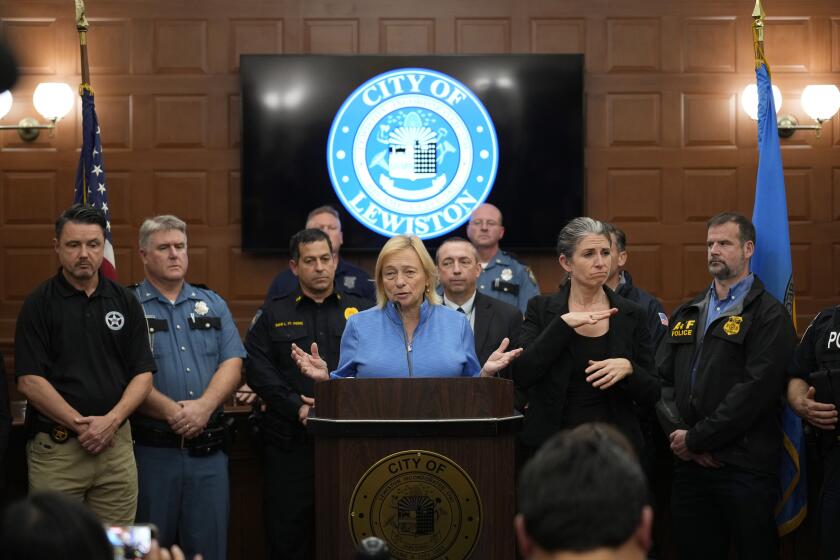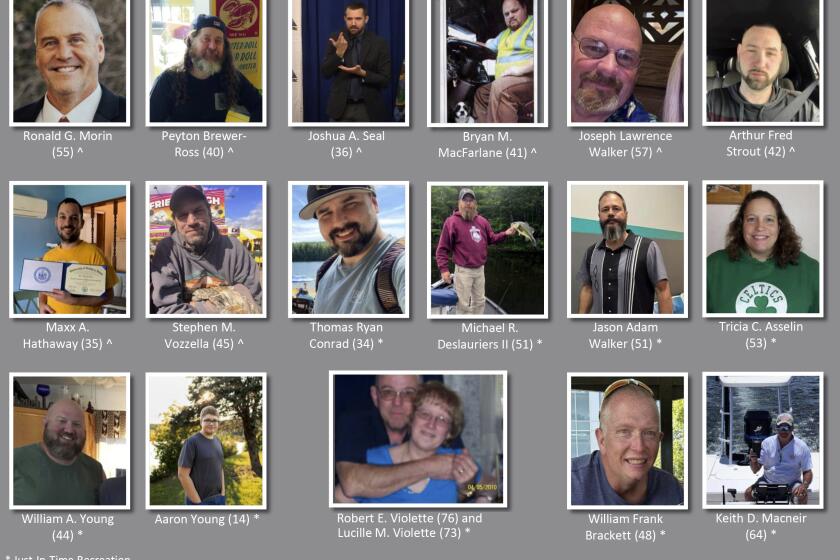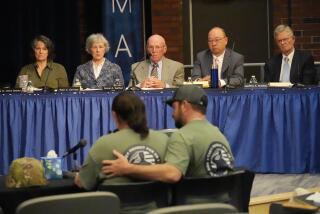Deaf community grieving after four men killed in Maine mass shooting
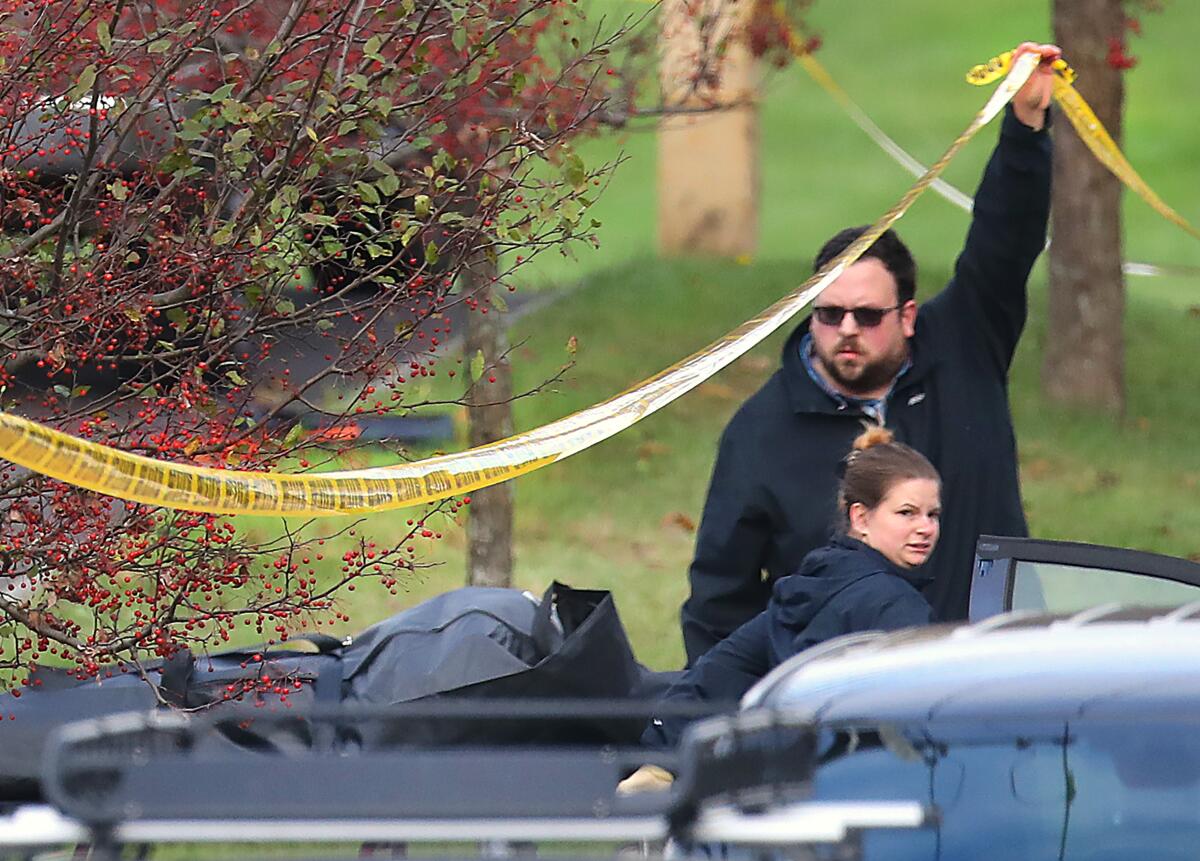
They had gathered at Schemengees Bar & Grille to play cornhole, as they did every Wednesday. They laughed, they talked, they drank, they sent beanbags sailing.
Their latest meeting began as a festive outing for nine friends, many of them alumni of the Governor Baxter School for the Deaf in Falmouth, Maine. But when the evening ended, half of them were dead. The rest were left reeling.
“The Deaf community is so close, it’s a scarring time,” said Jimmy Fitts, who lost four friends in the shooting. “We’re stressed and feeling the weight of this — our whole community.”
Survivors of that terrible evening reached out to 41-year-old Fitts, who lives in North Carolina, shortly after the mass shooting. He awoke Thursday morning to a flurry of horrified texts. On video calls, he could see the terror on his friends’ faces as they recounted the assault.
Chris Dyndiuk was facing the door as the shooter entered wearing a tan hoodie and wielding an assault rifle.
“Before he could do anything, the shooter just started,” Fitts, who also is deaf, told The Times via video phone.
One of the men felt a bullet go by his head. Another felt one graze his arm. Dyndiuk told Fitts he and others in the group managed to escape when the gunman stopped shooting to reload.
“They all feel so shaken up by the fact that they were so near death,” Fitts said.
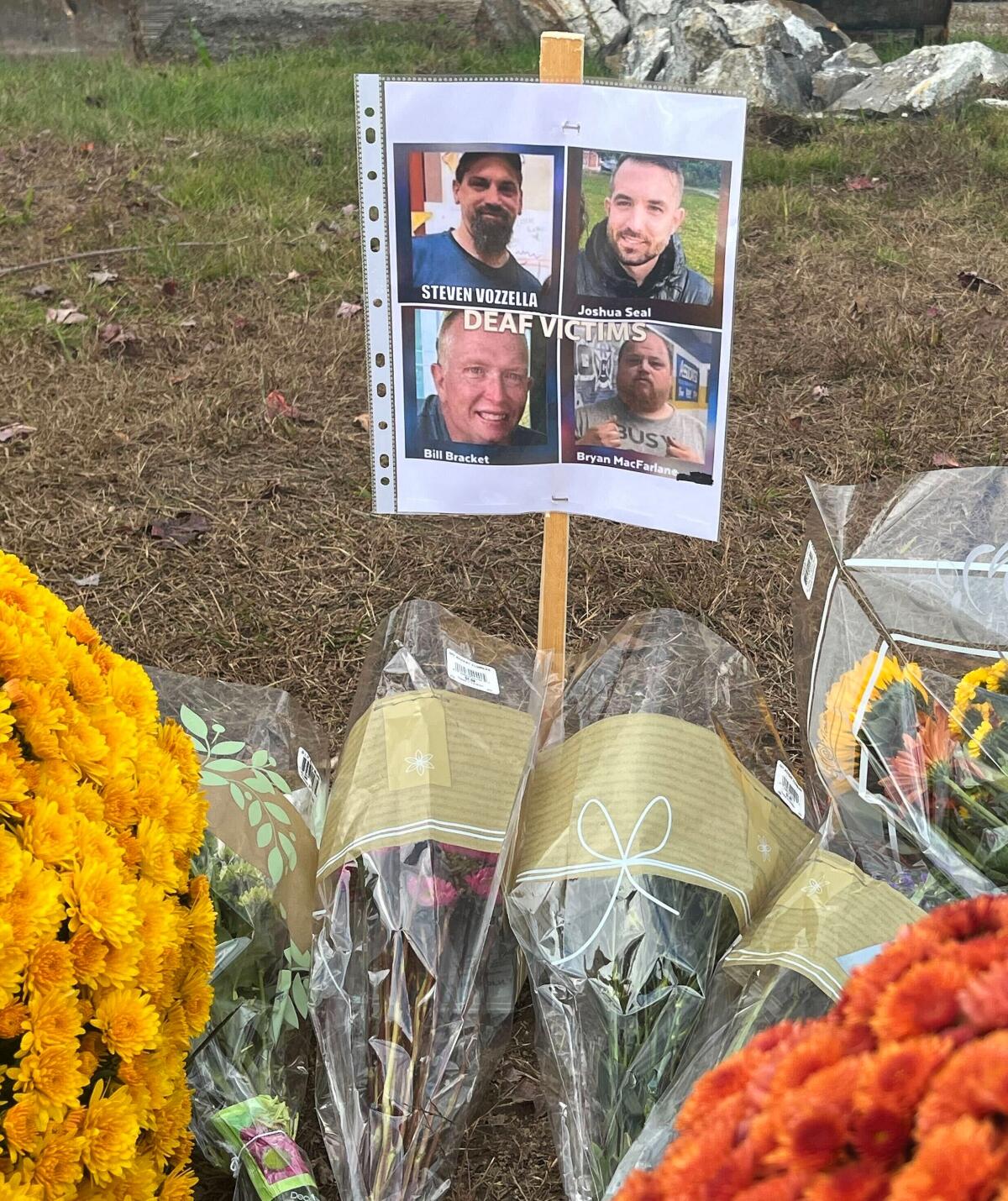
Among the victims was Joshua Seal, 36, the director of interpreting services for the Pine Tree Society, a nonprofit that supports Maine residents with disabilities; Bryan MacFarlane, 41, who had only recently moved back to Maine over the summer; Steve Vozzella, 45, who had been married only for a year; and William Brackett, 48, whose family described him as “a friend to many especially in the Deaf community he loved so much.”
In total, 18 people were killed in the shooting, which unfolded first at a bowling alley and then at the bar. Thirteen others were injured, including two deaf people.
The person authorities believe carried out the massacre, Robert Card, was found dead of a suspected self-inflicted gunshot wound on Friday, ending a manhunt that forced a swath of the state to shelter in place. Before the massacre, the 40-year-old appeared to be dealing with hearing loss. His sister-in-law Katie Card told news outlets that he had recently been fitted for high-powered hearing aids.
Since that time, she told NBC News, he said he began hearing voices. They said “horrible” things about him, she recounted, and his mental health spiraled.
“He was picking up voices that he had never heard,” she said. “His mind was twisting them around. He was humiliated by the things that he thought were being said.”
Maine shooting suspect found dead of apparent self-inflicted gunshot wound, ending days-long manhunt
Law enforcement found Robert Card dead at 7:45 p.m. Friday in the area of Lisbon Falls, not far from where his vehicle was located.
A “Maine Deaf Community Support” Facebook page was created the day after the shooting. By Friday, it had drawn more than 1,000 members. The page’s main photo — created by a CODA, the child of a deaf adult — featured an image of the state of Maine in black, with a red heart and the American Sign Language sign for “I love you.”
In posts on the page, people expressed frustration that they had been unable to see interpreters during coverage of early news conferences. They asked that interpreters from other states be brought in for funerals “so our interpreting community can grieve.”
On Friday, at an afternoon news conference, Maine Public Safety Commissioner Mike Sauschuck insisted that “for the consideration of the four deaf victims and their family, we are requesting that the ASL interpreter is in all frames for language access here in Maine and the U.S.”
“They are grieving and have a right to know the latest info in ASL,” he added.
That information came quickly through “The Daily Moth,” a website that delivers news in video using American Sign Language. In an email interview, host Alex Abenchuchan said he learned via text messages that there were multiple deaf victims in the shooting. He then connected with people in Maine and the family members of the victims, mainly using Facebook, he said.
Abenchuchan said it’s important to the Deaf community “to get the information they need in their first language, in the language that we are comfortable with and communicate with daily.”
His video about the four deaf victims had garnered more than 15,000 views by Saturday.
Although Abenchuchan, who is deaf, has done news recaps of mass shootings since starting “The Daily Moth” in 2015, he said “this is the first time that there were multiple deaf victims.”
“It is really heartbreaking for all of us to see that four deaf individuals were taken away in a senseless shooting,” he said in the email. “I think it’s important for people to know that being deaf is not just a disability — it is a sense of identity because we have a language and a culture. We are all connected with each other in some way.
“This tragedy has sent grief throughout the Deaf community in the U.S. and there is an outpouring of support for deaf people in Maine / the New England region.”
On Friday, Fitts was struggling to cope with the news. He and MacFarlane grew up together and both graduated from the Baxter School for the Deaf in 2000. They played ice hockey and would travel around participating in different leagues.
“He was such a good friend of mine and we all were so close,” Fitts said Friday.
“It’s hard to wrap our heads around what we even need right now. I haven’t slept in 24 hours myself. I have just stayed awake, staying on the phone talking with people, crying. It’s been impossible to shut my eyes and rest for even a second.”
Karen Turcotte, a mother of two deaf sons, is grappling with the fact that her son was supposed to be there with the group that night. He missed the outing only because his son had a soccer banquet.
The men who gathered Wednesday at the bar grew up together, she said, and all but one attended Baxter. Turcotte said she would often travel with the kids through high school to away games where they would play other deaf schools in soccer and basketball.
Brackett, one of the four deaf men who died in the shooting, graduated before her sons, she said, but they worked together on a pit crew for a race car driver in Oxford, Maine, for about four years.
“This Deaf community was very close,” Turcotte said.
About 100 people gathered for a Zoom vigil on Friday night, organized by the Maine Deaf Community Support Facebook page.
“There are no words or signs to express the feelings that we are all experiencing,” Terry Morrell, director of Maine’s Division for the Deaf, Hard of Hearing and Late Deafened, signed. “It’s so hard for any of us to come up with words that explain what we’re going through, and the most that we can do is to support each other and ourselves.
“When I say this loss is big, I mean immeasurable. It’s a huge loss for Maine.”
Authorities have identified the 18 people killed this week when a gunman opened fire at a bowling alley and restaurant in Lewiston, Maine. Here are their stories.
Attendees detailed the pain they’d experienced over the past days. One woman, a friend of Brackett‘s, described crying and not being able to work. Another friend of the victims said he has not been able to sleep since the shooting.
They also shared memories of their loved ones. Vozzella’s niece said he had moved to Maine to start a life with his wife and daughter. He was active in the Deaf community there, she said, and “cornhole was really, really special for him.”
Another mourner described MacFarlane — who loved to fish and hunt — as having supported him throughout his life and said he was “heartbroken” that he’s gone. Another person talked about Brackett’s sense of humor and painted him as a “very understanding person.”
One father detailed his pain for Seal’s wife and four children.
“Any kid needs their parent,” he said. He described Seal as “a wonderful man and a wonderful dad and a wonderful husband.”
As the vigil neared its end, a man shared a song:
“If I had seven minutes in heaven, I’d spend them all with you,” he signed, as another vigil-goer interpreted for hearing participants.
Afterward, he held out his thumb, index and little fingers, signing a message to his community and beyond: “I love you.”
Times staff writer Jeong Park contributed to this report.
More to Read
Sign up for Essential California
The most important California stories and recommendations in your inbox every morning.
You may occasionally receive promotional content from the Los Angeles Times.

